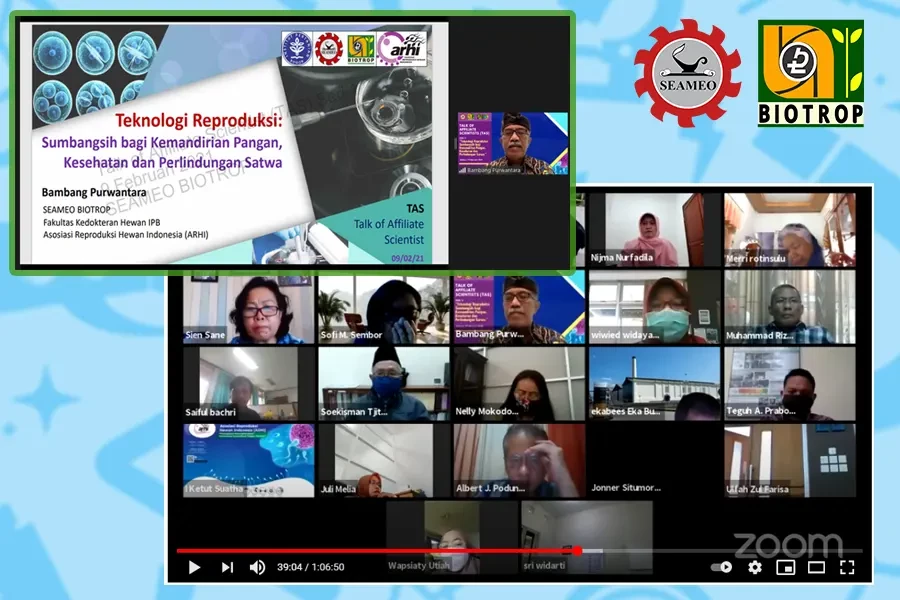As one of SEAMEO Centres in Indonesia, under the Secretariat General of the Ministry of Education and Culture of the Republic of Indonesia (MoEC), SEAMEO BIOTROP has mandates to carry out research, trainings and information dissemination. In his remarks, Dr Zulhamsyah Imran stated that based on its mandates and in realizing one of the BID-100 programs, SEAMEO BIOTROP holds a series of scientist programs called “Talk of Affliliate Scientitst (TAS)”, which aims to communicate research results as well as to exchange information and field experiences to various stakeholders. The resource persons of the TAS program will be researchers who conduct research in broad fields of tropical biology.
Furthermore, Dr Zulhamsyah explained that the theme of the first TAS program “Reproductive Technologies: Contributions to Food Self-Sufficiency, Health and Animal Protection” was selected to implement SEAMEO BIOTROP second program thrusts, i.e., Sustainable Management of Intensively Used Ecosystems/Landscapes . In conserving biodiversity, SEAMEO BIOTROP focuses on both terrestrial and aquatic biotas. Subsequently, Dr Zulhamsyah stated that genetic identification of seawater lobster is currently being conducted to support food security and elevating the welfare of fishermen. Dr Zulhamsyah shared his expectations that reproductive technology will be developed and implemented to aquatic biota.
The resource person of this event was Prof Dr Bambang Purwantara, who is an expert in reproductive biotechnology and one of SEAMEO BIOTROP scientist. This event was joined using online and offline platforms by 90 participants from research and development institutions, universities, high schools and private sectors.
In his presentation, Prof Dr Bambang Purwantara shared materials on food necessity and conventional breeding; categories and history of reproductive technology; assisted reproductive technology (ART) and food fulfillment, cloning and transgenic; In Vitro Fertilization (IVF) and Intracytoplasmic Sperm Injection (ICSI) for human and animal; as well as genome editing. In his further explanation, Prof Bambang stated that genetic engineering
can be done in fish, such as gen insertion in salmon fish to increase its growth and in clown fish to modify its color. Genome editing technology is a form of genetic engineering which includes DNA insertion, replacement, or cutting of genomes in live organisms by using nuclease enzymes. Genome editing has been proven useful in producing healthier cattles with high production of milk and meat. The CRISPR-Cas9 genome editing technology provides a mean to DNA editing through targeted genes. The CRISPR-Cas9 technology is considered qualified due to its capability for targeting certain genes with high accuracy. However, the use of CRISPR-Cas9 technology is currently still limited to plants and animals.
(ds/per)
 Tuesday, 16 February 2021 on 5:15pm
Tuesday, 16 February 2021 on 5:15pm
